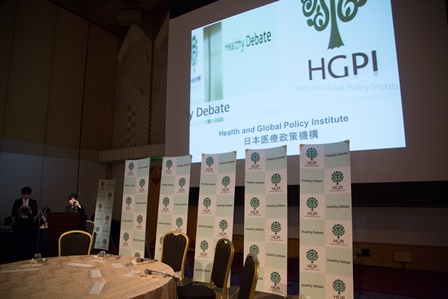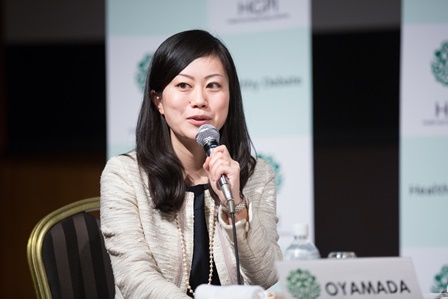[Event Report] Health Policy Summit 2016
date : 3/3/2016
Leading the World: Japan’s approach to solving health issues


Session 1: Sustainability in Health Care
The Despite the economic slump and limited health care resources, health care needs and medical costs continue to rise. Methods allowing a balance to be struck between health care cost suppression and health care quality improvement initiatives will become an issue in the near future. Is it possible for innovation and sustainability to coexist amidst the everlasting invention of ground breaking new drugs and new health care technologies. As a first step into the topic of financial affairs, discussions were held focusing on ways to improve sustainability in health care.
Panelists
Hirotaka Unami
(Senior Director for Social Security Budget, Ministry of Finance)
(Managing Director, Chief Economist, Morgan Stanley MUFG Securities Co., Ltd.)
Moderator
(HGPI Senior Manager)





Session 2: Global Health – G7 Summit and beyond
In 2016, Japan is playing host to the G7 Summit and Health Ministers’ Meeting, giving Japan the opportunity to strengthen its role as a global health leader and significantly contribute to the improvement of health around the world. The meaning of global health, which up until now has been focused on development assistance, is currently changing. This session focused on the contributions Japan is expected to make and the benefits of these contributions to Japan’s future. Panelists and participants discussed human resource development and the disaster management frameworks required at a global level.
Kenji Shibuya
(Professor, Department of Global Health Policy, Graduate School of Medicine, The University of Tokyo; President, Japan Institute for Global Health (JIGH))
Yasuhiro Suzuki
(Assistant Minister for Technical Affairs & Chief Global Health Officer, Ministry of Health, Labour and Welfare)
Yoshiharu Yoneyama
(Deputy Director General, and Group Director for Health 2, Human Development Department, Japan International Cooperation Agency (JICA))
Anne Smith
(Manager, Health and Global Policy Institute)





Session 3: The Future of Health Care
Due to the size of the challenges faced and the height of the hurdles that need to be overcome, discussions about health care policy tend to stop at merely pointing out that issues exist. The original purpose of health care was to bring about “bright, future-oriented stories” by ensuring health for the people and the creation of a strong foundation for society. This session saw deep discussions surrounding emerging resources and innovative ideas aimed at supporting health policy makers and stakeholders in the construction of a stronger and more optimistic health care system.
Seigo Izumo
(Senior Vice President, Global Head of Regenerative Medicine Unit and Head of Scientific Affairs in Japan at Takeda Pharmaceutical Company)
Tomiko Tawaragi
(Chief Safety Officer, Pharmaceuticals and Medical Devices Agency (PMDA))
Shinsuke Muto
(President of Tetsuyu Institute Medical Corporation, Japan; Executive Advisor for Information Policy, MHLW; Co-Founder & Medical Director (Admin), Tetsuyu Healthcare Holdings, Japan)
Moderator
Ryoji Noritake
(Fellow, Health and Global Policy Institute; Consultant, Project HOPE (U.S. based NGO)









Co-hosted by Global Health Innovative Technology Fund (GHIT Fund)
Special sponsorship from Miraca Holdings
Supported by Ministry of Health and Labour and Welfare, and Ministry of Foreign Affairs
With cooperation from National Graduate Institute for Policy Studies, Global Health Innovation Policy Program
(Photos by Kazunori Izawa )
Exhibition date:2016-02-27
Top Research & Recommendations Posts
- [Policy Recommendations] The Path to a Sustainable Healthcare System: Three Key Objectives for Public Deliberation (January 22, 2026)
- [Research Report] Perceptions, Knowledge, Actions and Perspectives of Healthcare Organizations in Japan in Relation to Climate Change and Health: A Cross-Sectional Study (November 13, 2025)
- [Research Report] The 2025 Public Opinion Survey on Healthcare in Japan (March 17, 2025)
- [Policy Recommendations] Reshaping Japan’s Immunization Policy for Life Course Coverage and Vaccine Equity: Challenges and Prospects for an Era of Prevention and Health Promotion (April 25, 2025)
- [Research Report] The 2023 Public Opinion Survey on Satisfaction in Healthcare in Japan and Healthcare Applications of Generative AI (January 11, 2024)
- [Research Report] AMR Policy Update #4: Cancer Care and AMR (Part 1)
- [Public Comment Submission] “Assessment Report on Climate Change Impacts in Japan (Draft Overview)” (December 24, 2025)
- [Policy Recommendations] Developing a National Health and Climate Strategy for Japan (June 26, 2024)
- [Research Report] The 2026 Public Opinion Survey on Healthcare in Japan (February 13, 2026)
- [Research Report] The Public Opinion Survey on Child-Rearing in Modern Japan (Final Report) (March 4, 2022)
Featured Posts
-
2026-01-09
[Registration Open] (Hybrid Format) Dementia Project FY2025 Initiative Concluding Symposium “The Future of Dementia Policy Surrounding Families and Others Who Care for People with Dementia” (March 9, 2026)
![[Registration Open] (Hybrid Format) Dementia Project FY2025 Initiative Concluding Symposium “The Future of Dementia Policy Surrounding Families and Others Who Care for People with Dementia” (March 9, 2026)](https://hgpi.org/en/wp-content/uploads/sites/2/dementia-20260309-top.png)
-
2026-02-05
[Registration Open] (Webinar) The 141st HGPI Seminar “Current Status and Future Prospects of Korea’s Obesity Policy: Voices of People with Lived Experience in Policy Promotion” (March 3, 2026)
![[Registration Open] (Webinar) The 141st HGPI Seminar “Current Status and Future Prospects of Korea’s Obesity Policy: Voices of People with Lived Experience in Policy Promotion” (March 3, 2026)](https://hgpi.org/en/wp-content/uploads/sites/2/hs141-top-1.png)




